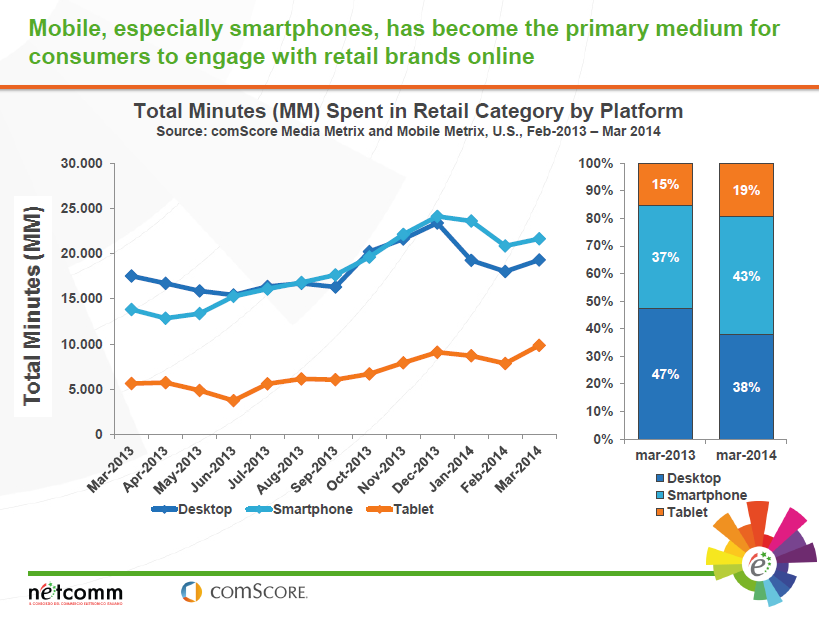How Mobile Marketing Is Reshaping E-commerce

Table of Contents
The Explosive Growth of Mobile Commerce (m-commerce)
The dominance of mobile in e-commerce is undeniable. M-commerce, or mobile commerce, is experiencing staggering growth, transforming how consumers shop and businesses operate. The shift towards mobile shopping is driven by increased smartphone penetration, improved mobile internet access, and the convenience offered by user-friendly mobile websites and apps.
- Percentage of online sales driven by mobile devices: Studies consistently show that a significant and growing percentage of online sales now originate from mobile devices. This figure varies by industry and region but is consistently above 50% in many markets, and climbing.
- Growth projections for m-commerce in the coming years: Analysts predict continued exponential growth in m-commerce over the next decade. The expectation is for mobile to become the primary channel for online shopping for many businesses.
- Examples of successful m-commerce businesses: Companies that have successfully embraced mobile-first strategies, such as Amazon, Alibaba, and many direct-to-consumer brands, are seeing significant returns on investment in mobile marketing and development. Their success highlights the importance of a strong mobile presence.
- Key factors contributing to m-commerce growth: Beyond improved technology, factors like the rise of mobile payment options (Apple Pay, Google Pay, etc.), the increasing use of mobile wallets, and the seamless integration of online and offline shopping experiences are key drivers of this growth.
Key Mobile Marketing Strategies for E-commerce Success
To thrive in the mobile-first e-commerce environment, businesses must implement effective mobile marketing strategies. This involves a multi-pronged approach, leveraging various channels and technologies.
-
Mobile App Marketing: A dedicated mobile app can significantly boost engagement and sales. App store optimization (ASO) is crucial for visibility, focusing on relevant keywords and compelling app descriptions. In-app purchases, push notifications for timely promotions, and personalized content significantly improve user engagement and drive sales.
-
SMS Marketing: SMS marketing remains a powerful tool, particularly for sending promotional offers, order confirmations, and appointment reminders. However, it's vital to adhere to best practices and legal compliance regarding opt-in procedures and message frequency. Personalized SMS messages can increase open rates and conversion rates.
-
Location-Based Marketing: Leveraging location services unlocks significant opportunities. Geofencing allows businesses to target customers within a specific geographic radius, offering location-specific deals and promotions. Proximity marketing uses Bluetooth beacons to send targeted messages to users in close proximity to a physical store.
-
Mobile SEO (Search Engine Optimization): A mobile-friendly website with responsive design is non-negotiable. Optimizing content for mobile search, using mobile-specific keywords, and ensuring fast loading speeds are vital for ranking well in mobile search results.
-
Mobile Advertising: Mobile advertising, encompassing in-app ads, banner ads, and video ads, is a crucial channel for reaching potential customers. Platforms like Google Ads and social media advertising platforms allow for highly targeted mobile ad campaigns.
Leveraging Social Media for Mobile E-commerce
Social media and mobile e-commerce are intrinsically linked. Social platforms facilitate direct sales, brand building, and customer engagement.
- Using shoppable posts and stories: Platforms like Instagram and Facebook offer features that allow users to purchase products directly through social media posts and stories, streamlining the buying process.
- Running targeted mobile ad campaigns: Social media platforms offer powerful targeting options, enabling businesses to reach specific demographics and interests through mobile ad campaigns.
- Leveraging influencer marketing: Partnering with relevant influencers can significantly increase brand awareness and reach among target audiences on mobile devices.
- Utilizing social media for customer service: Responding promptly to customer inquiries and feedback on social media channels enhances customer satisfaction and builds brand loyalty.
Analyzing Mobile Marketing Performance and Optimizing Campaigns
Data-driven decision-making is crucial for success. Analyzing key performance indicators (KPIs) and using analytics tools allows for continuous optimization.
- Key metrics to track: Monitor click-through rates (CTR), conversion rates, app downloads, customer acquisition cost (CAC), and customer lifetime value (CLTV) to measure the effectiveness of mobile marketing campaigns.
- Using analytics platforms: Utilize platforms like Google Analytics to track mobile traffic, user behavior, and campaign performance in detail.
- A/B testing: Conduct A/B testing on different mobile ad creatives, landing pages, and push notification messages to identify the most effective variations.
- Adapting strategies: Regularly analyze data and adapt strategies based on performance insights. This iterative approach is essential for continuous improvement.
Conclusion
Mobile marketing has fundamentally reshaped the e-commerce landscape. The explosive growth of m-commerce necessitates a mobile-first approach, embracing strategies like mobile app marketing, SMS marketing, location-based marketing, mobile SEO, and social media marketing. By analyzing key performance indicators and optimizing campaigns based on data-driven insights, businesses can unlock the full potential of mobile marketing and gain a competitive edge. Embrace the power of mobile marketing to transform your e-commerce business. Start implementing these mobile marketing strategies today to boost your online sales and unlock new levels of growth in the mobile-first economy. For further resources on mobile marketing strategies, explore reputable online marketing resources and industry blogs.

Featured Posts
-
 I Synodos Toy Patriarxeioy Ierosolymon Kai Oi Simantikes Tis Apofaseis
May 19, 2025
I Synodos Toy Patriarxeioy Ierosolymon Kai Oi Simantikes Tis Apofaseis
May 19, 2025 -
 Sztuczna Inteligencja O Eurowizji 2025 Perspektywy Dla Polski
May 19, 2025
Sztuczna Inteligencja O Eurowizji 2025 Perspektywy Dla Polski
May 19, 2025 -
 Uk First Class Stamp Price Increase To 1 70 What You Need To Know
May 19, 2025
Uk First Class Stamp Price Increase To 1 70 What You Need To Know
May 19, 2025 -
 Enatenisi Kai Syntrivi Prolipsi Kai Antimetopisi
May 19, 2025
Enatenisi Kai Syntrivi Prolipsi Kai Antimetopisi
May 19, 2025 -
 Jennifer Lawrence And Cooke Maroney Welcome Second Child
May 19, 2025
Jennifer Lawrence And Cooke Maroney Welcome Second Child
May 19, 2025
